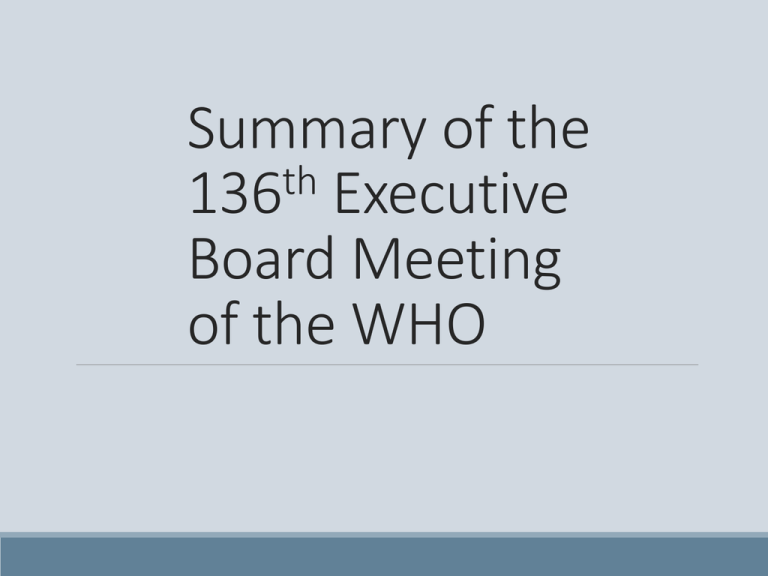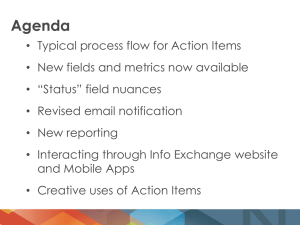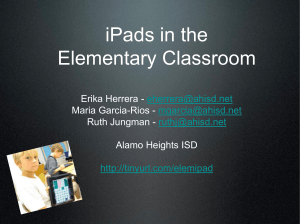here
advertisement

Summary of the th 136 Executive Board Meeting of the WHO Issues Covered at the EB • Ebola • Administrative Issues ◦ Budget Space Allocation ◦ Implementation of the International Health Regulations ◦ Framework for Engagement with Non State Actors • Disease Related Topics ◦ New and Existing Infectious Diseases ◦ Antimicrobial Resistance ◦ Malaria ◦ The Draft Global Plan of Action for Public Health, Innovation, and Intellectual Property • Noncommunicable Diseases ◦ Second International Conference on Nutrition ◦ Health and the Environment ◦ Childhood Obesity ◦ Violence and Health ◦ Follow-Up to the 2014 UN High Level Meeting on NCDs Special Session on Ebola Virus Outbreak Executive Board called a special session on Sunday, January 25th to discuss the initiatives needed to end the current outbreak Member states all recognized that the outbreak is being dealt with on the basis of the WHO’s Emergency Response Framework ◦ Increased acknowledgment of need for all International Health Regulations to be implemented more effectively ◦ Strengthening health systems on a national level Related Documentation: http://apps.who.int/gb/ebwha/pdf_files/EB136/B136_INF8-en.pdf Special Session on Ebola Virus Outbreak Proposed plan requests that: ◦ Director General take necessary surveillance steps to keep track of the outbreak ◦ Member States to further strengthen their health systems, with the Director General offering technical advice to affected countries ◦ Member states work on the training and recruiting of a skilled health workface ◦ Member States send aid to countries when needed through the coordination and integration of resources ◦ Director General make sure that in cases of emergency, money can be reallocated from a special reserve emergency fund ◦ Emergency global workforce is to be trained and ready to respond to an emergency situation These are condensed versions of all of the specific decisions made in the meeting. The Director General will be reporting on the WHO’s preparedness for emergencies at the EB session in May Due to the urgency of the matter, the plan was approved and went into effect immediately Budget Space Allocation Member States wanted to deviate from the status quo Segment 1, dealing with country-level funding caused disagreement ◦ Member States urged the DG to consider regional needs ◦ Director General set up a working group ◦ New draft of Segment 1 will be finished in March and presented at the WHA in May Segments 2 (provision of global and regional goods), 3 (management and administration), and 4 (response to emergency events) were approved Implementation of the International Health Regulations Ebola outbreak served as a reminder of why health systems need to be strengthened Consensus on the need to control points of entry into countries, and to improve surveillance and reporting mechanisms Issues with the IHRs ◦ Deadline extension requests ◦ Zambia breaks the mold ◦ Monitoring and measuring core capacities ◦ Need for a universal, unbiased monitoring system Argentina proposed to draft a new plan for Yellow Fever risk mapping and vaccination of travelers ◦ Requesting mandatory booster vaccines for travelers who have had the Yellow Fever vaccine ◦ Mandatory vaccination of all travelers leaving an area where there is risk of Yellow Fever Related Documents: http://apps.who.int/gb/ebwha/pdf_files/EB136/B136_R6-en.pdf Yellow Fever Proposal: http://apps.who.int/gb/ebwha/pdf_files/EB136/B136_R5-en.pdf Framework for Engagement with Non-State Actors Growing recognition that cooperation with private sector is necessary Proposal by Argentina ◦ Proposed amendments on the following topics were made by member states: ◦ Conflict of interest ◦ Involvement with industries ◦ Transparency ◦ Role of the private sector ◦ Definition of unclear terms used in proposal ◦ Policy norms and compliance ◦ Regional differences ◦ A drafting group was set up following Argentina’s proposal Related Documents: http://apps.who.int/gb/ebwha/pdf_files/EB136/B136_CONF5Rev1-en.pdf Framework for Engagement with Non-State Actors ◦ Member states are to submit their proposals for amendments or addition/deletion by 16 February 2015 ◦ Director General compile and make available to Member States by 9 March 2015 Intergovernmental meeting to be held 30 March-1 April 2015 ◦ Discussion and decisions on proposed amendments Present amendments at 68th WHA in May Related Documents: http://apps.who.int/gb/ebwha/pdf_files/EB136/B136_CONF5Rev1-en.pdf New and Existing Infectious Diseases Member States praised WHO’s response to the 2014 Ebola outbreak Millennium Development Goals have been helpful to Global Health Areas of concern: ◦ ◦ ◦ ◦ Dengue and Climate Change Antimicrobial Resistance and its effect on TB and Gonorrhea Re-emergence of Polio Neglected Tropical Diseases The African Region announced concern for Plague outbreak in Madagascar New and Existing Infectious Diseases Japanese Firm has come up with a new drug for TB Russia working on a plan for Antimicrobial Resistance Director General spoke on the importance of strengthening health systems by: ◦ Working with the private sector ◦ Making medicines available to the poor ◦ Getting governmental cooperation and commitment Antimicrobial Resistance The draft was widely accepted Importance of stopping antimicrobial resistance was acknowledged by all member states ◦ AMR threatens modern medicine Need for gaining political support across all sectors ◦ Health ◦ Agriculture ◦ Food Iran proposed the inclusion of vaccination of all workers and surveillance of all antibiotics used across sectors into the draft Malaria Strategy 2016-2030 Post 2015 Malaria Strategy supported overall by Member States Goals outlined: ◦ ◦ ◦ ◦ ◦ ◦ 90% mortality reduction Eliminate Malaria in 35 new countries Maintain Malaria-free status in countries that have eliminated Malaria Strengthen cross-border surveillance Strengthen research and development of new treatments and preventions Ensure universal access to prevention and treatment Malaria Strategy 2016-2030 Member states concerned with re-emergence of indigenous Malaria cases Concerned with insecticide resistance Director General is asked to provide technical support to Member States when implementing the Global Strategy 2016-2030 Related Documentation: http://apps.who.int/gb/ebwha/pdf_files/EB136/B136_CONF2-en.pdf http://apps.who.int/gb/ebwha/pdf_files/EB136/B136_R1-en.pdf The Draft Global Plan of Action for Public Health, Innovation, and Intellectual Property Member States interested in the idea of intellectual property sharing to increase access to medical technologies Previously unsuccessful action plan from 2008 with a 2014 deadline was reevaluated at the 136th WHO Executive Board Meeting The decision was to extend the overall project to 2022 and establish an evaluation process that works for all Member States The Director General is to provide a report on the Comprehensive Action Plan and a plan of action for intellectual property sharing that will be presented at the 68th WHA The deadline for resolving differences and implementing the plan of action is 2018 Related Documentation: http://apps.who.int/gb/ebwha/pdf_files/EB136/B136_CONF7Rev2-en.pdf Second International Conference on Nutrition Draft resolution proposed by Member States 40 plus countries are cosponsoring the decision Malnutrition throughout different food systems was addressed ◦ Micronutrient deficiencies ◦ Under-nutrition ◦ Over-nutrition Emphasis on conflict of interest The Director General is urged to collaborate with the Director General of the FAO and other UN Nutrition agencies ◦ Preparing policy briefs for multi-sectoral cooperation Member states urged to begin implementing the Rome Declaration via the Framework for Action Proposal calls for the formation of a biennial report on progress of the Rome Declaration initiatives to be approved at the WHA Related Documentation: http://apps.who.int/gb/ebwha/pdf_files/EB136/B136_CONF8Rev1-en.pdf Health and the Environment Proposal by Chile, Colombia, France, Monaco, Norway, Panama, Ukraine, the United States, Uruguay, and Zambia to form a plan of action for enforcing WHO air pollution guidelines ◦ Urges member states to emphasize the importance of avoiding air pollution ◦ Urges member states to choose to use more environmentally friendly products to the best of their financial ability ◦ Informs member states that the WHO air quality guidelines are helpful for assessing air quality in every country ◦ Asked Director General to work with UN partners to reduce environmental risk Related Documentation: http://apps.who.int/gb/ebwha/pdf_files/EB136/B136_CONF9Rev1-en.pdf Childhood Obesity Regional committees were set up to develop a specific set of needs to be addressed by each region The Director General emphasized the importance of breastfeeding Regional working Groups are currently meeting There will be a new Plan of Action in March Violence and Health Global Status Report Recognition by Member States that interpersonal violence is important ◦ Emphasis on violence against women, children, and the elderly ◦ Intimate partner violence is also an issue ◦ Member States pledged their commitment to reducing violence in their countries WHO is in the process of policy development Plan of Action will finished by January 2016 There will be consultation with other UN agencies that deal with violence The report was noted with guidance offered Follow-Up to the 2014 UN High Level Meeting on NCDs The high level meeting in 2011 resulted in a declaration was adopted by United Nations Member States for commitment to preventing and controlling noncommunicable diseases Member States would like to see a framework developed to measure the progress of interventions at the country level ◦ Director General ruled that it is unnecessary to add the indicators and targets in on a country level ◦ To eliminate confusion from Member States, a briefing was organized to explain in the report in detail Assessment to be done by 2017 Thank you for listening Questions?





